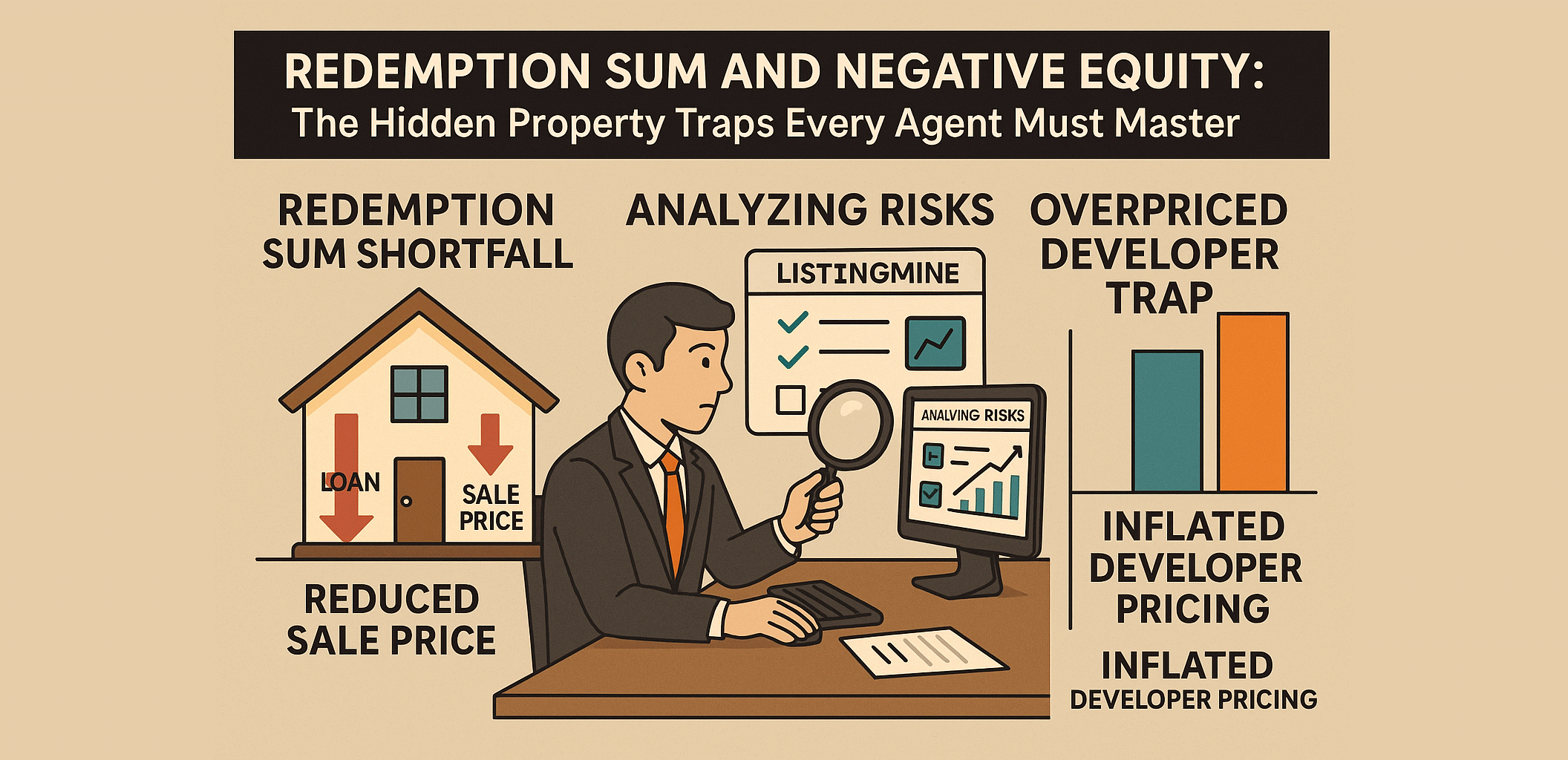Redemption Sum and Negative Equity: The Hidden Property Traps Every Agent Must Master

In the Malaysian property market, one of the most common causes of failed subsale transactions is the redemption sum—the outstanding debt a seller owes to their bank before the property title can be transferred.
Understanding how the redemption sum works, and crucially, recognizing when it creates a redemption shortfall (negative equity), is critical for agents dealing with any property, especially distressed or below-market-value (BMV) listings.
1. What is the Redemption Sum?
The redemption sum is the total remaining balance of the mortgage loan that must be fully paid to the financier. This settlement is mandatory before the bank releases the property title from charge, allowing it to be legally transferred to a new buyer.
Simply put, it's the amount the seller still owes. If this sum is not paid off, the transaction cannot be completed, regardless of how far along the process has gone.
2. When the Redemption Sum Kills the Deal
A major problem arises when the redemption sum exceeds the agreed selling price—a situation known as a redemption shortfall or negative equity.
This frequently occurs in transactions where the seller is forced to sell at a loss due to:
Economic downturns or forced liquidation.
Failed speculative purchases.
Overleveraged loans from previous refinancing.
When the selling price is lower than the outstanding loan, the seller is required to cover the differential amount out of their own pocket to settle the bank. If the seller cannot produce this shortfall amount, the deal collapses.
3. The Agent’s Essential Checkpoint
A professional agent’s responsibility is to verify early whether the seller can realistically cover any potential shortfall.
Sellers may claim they can secure a personal loan or borrow from family, but agents must vet these claims strictly. Unless the funds are readily available and confirmed, the transaction may be a waste of time for all parties.
Agents protect their clients and their commission by:
Requesting the Redemption Statement from the seller’s bank early in the process.
Calculating the shortfall against the proposed selling price immediately.
Setting realistic expectations for the seller before listing or negotiating.
Overpriced Projects: The Root Cause of Negative Equity
A less obvious, but major, source of redemption shortfalls in Malaysia stems from overpriced developer projects, particularly those launched during housing booms.
4. The Illusion of "Free" Perks
Many inexperienced buyers are attracted by aggressive developer marketing packages that promise:
High cash-back rebates.
Guaranteed rental returns (GRR).
"Free" renovations, cars, or furniture.
What these buyers often fail to grasp is that these perks are not truly free—they are already built into the inflated selling price of the property. Developers collaborate with banks to approve loans based on this artificially high "selling" price, which misrepresents the property's true market value. The buyer unknowingly borrows significantly more than the asset is worth.
5. The Speculative Debt Trap
Inexperienced buyers, often those with lower incomes, are especially vulnerable. They may resort to risky financial behavior, believing that property prices will always rise fast enough to justify their overpayment.
However, when the market slows, or when guaranteed rental schemes fail, these buyers are left with properties that are worth less than their remaining loan amount.
Unable to keep up with instalments, they become distressed sellers.
When they try to sell, the selling price cannot cover the redemption sum, trapping them in negative equity with the real risk of bankruptcy.
6. The Agent’s Ethical Role
Responsible agents have an ethical duty to protect clients from these speculative traps. Agents should actively:
Educate buyers about the hidden costs of "free" developer perks.
Focus on properties with genuine positive equity potential and real end-user demand.
Build credibility by guiding clients toward sound, sustainable investment choices.
By prioritizing their clients' financial health, agents not only protect their clients but also solidify long-term trust, guaranteeing future repeat business and referrals.
The redemption sum is more than a financial technicality—it is a deal checkpoint that exposes the true financial health of a property and its seller.
Agents who master this concept, and learn to identify overpriced or negative-equity risks early, will avoid wasted deals and significantly strengthen their professional credibility. ListingMine helps agents document, track, and analyze transaction data systematically—from redemption values to loan details—empowering them to close safer, smarter, and more sustainable deals.











































































































